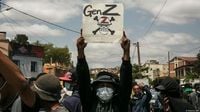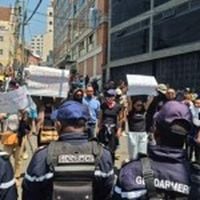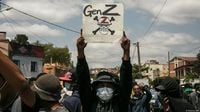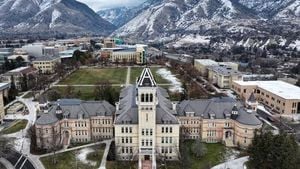In a dramatic response to mounting unrest, Madagascar’s President Andry Rajoelina dissolved his government on September 30, 2025, after days of youth-led protests spiraled into deadly violence across the Indian Ocean island. The demonstrations, spearheaded by a movement calling itself Gen Z, erupted in outrage over chronic electricity blackouts, water shortages, and grinding poverty—issues that have plagued the country for years and now boiled over into the streets of the capital, Antananarivo, and other major cities.
According to the United Nations human rights office, at least 22 people lost their lives during the clashes, and more than 100 were injured. The UN attributed many of the deaths to what it called a “violent response” by security forces, with protesters and bystanders killed, but also noted that some fatalities resulted from looting and violence by gangs not associated with the demonstrations. “The protests began peacefully on Thursday, but the security forces intervened with unnecessary force, lobbing tear gas and beating and arresting protesters. Some officers also used live ammunition,” the UN rights office said, echoing widespread shock at the escalation of force.
Madagascar’s Foreign Minister Rasata Rafaravavitafika pushed back against the UN’s figures, stating, “the government strongly denies that 22 people had died.” Despite this denial, authorities have not released their own official casualty numbers, and President Rajoelina himself, while expressing sympathy for the bereaved, offered no alternative death toll in his national address. This lack of clarity has only fueled public suspicion and anger.
The protests, which began on September 25, were sparked by deep frustration over persistent power cuts and water shortages, but quickly grew into a broader movement demanding accountability and systemic change. The demonstrators—primarily young people—adopted the pirate flag from the popular Japanese anime series “One Piece” as their rallying symbol, mirroring youth-led protests in Nepal, Kenya, Indonesia, the Philippines, and France. Placards carried by protesters bore slogans such as “Justice for Madagascar,” “We want to live, not just survive,” and “Leo”—Malagasy for “we’re fed up.”
In his televised address announcing the dissolution of the government, Rajoelina said, “I have decided to terminate the functions of the Prime Minister and the government.” He added that Prime Minister Christian Ntsay and other officials would stay on in an interim capacity until a new government could be formed. Rajoelina invited applications for government positions and set a three-day window to review proposals for a new prime minister. “Your demands have been heard, and I apologize if there are members of the government who have not done the work that the people expected,” he said, acknowledging the anger and hardship caused by the failures in basic services.
Despite calls from the streets for both Ntsay and Rajoelina to resign, the president gave no indication that he would step down. Instead, he positioned himself as a leader responding to the people’s grievances, while critics accused his administration of being unprepared for the crisis. The protests gained momentum on social media and have been widely compared to other recent Gen Z-led anti-government movements around the world.
The government’s response to the unrest included imposing nighttime curfews in Antananarivo from the first day of protests and extending them to other cities soon after. Security forces repeatedly fired tear gas at crowds, and reports surfaced of rubber bullets being used. The violence escalated further as protesters barricaded roads with burning tires and rocks, and several newly built cable car stations in the capital were set ablaze. Local media also reported attacks on the homes of politicians allied with Rajoelina.
Madagascar’s infrastructure problems are deeply entrenched. The state-owned utility, Jirama, which supplies electricity and water, typically posts daily outage schedules on Facebook. But on the day protests broke out, the company abruptly suspended its social media activity for 36 days—a move that left many citizens in the dark, both literally and figuratively. Only 36% of the country’s 31 million residents have access to electricity, and even for them, hours-long outages are the norm. The World Bank has recorded a sharp rise in poverty in Madagascar’s urban areas in recent years, and the island nation now ranks among the bottom ten on the UN’s Human Development Index.
Experts say Madagascar’s resource challenges go far beyond mismanagement. The country is one of the world’s poorest, and recurring wildfires, environmental degradation, and climate change have only exacerbated the struggle to provide basic services. Three-quarters of the population lived below the poverty line in 2022, according to the World Bank. The current unrest, then, is the latest chapter in a long-running saga of hardship and frustration.
The Gen Z movement has drawn inspiration from similar youth uprisings abroad, borrowing symbols and tactics that have resonated with a generation raised on global connectivity. The pirate flag from “One Piece,” already a fixture in protests in Nepal and Kenya, has become a unifying emblem for Malagasy youth demanding change. Many protesters wore black, a color of mourning and defiance, as they called for Rajoelina’s resignation and new elections—demands the president has so far resisted.
Rajoelina, 51, is no stranger to political turmoil. He first rose to power as the head of a provisional government following a 2009 coup and was elected president in 2019. His reelection in 2023 was marred by a boycott from most opposition candidates, fueling claims of a lack of legitimacy. Now, as he attempts to steer the country through its latest crisis, Rajoelina faces a restive population that is increasingly unwilling to accept the status quo.
The Southern African Development Community (SADC) has called for calm and dialogue, expressing deep concern over the violence and urging all parties to find a peaceful resolution. Meanwhile, the United Nations’ top human rights official, Volker Turk, voiced shock “at the violent response by security forces to the ongoing protests in Madagascar.” The UN and other international observers continue to monitor the situation closely, warning that further escalation could have dire consequences for a country already teetering on the edge.
As Madagascar’s leaders scramble to form a new government and restore order, the Gen Z movement remains undeterred. Their message is clear: water, electricity, and dignity are not privileges—they are basic human rights. Whether the government’s reshuffle will be enough to quell the anger on the streets remains to be seen, but one thing is certain—the youth of Madagascar have found their voice, and they are determined to be heard.






